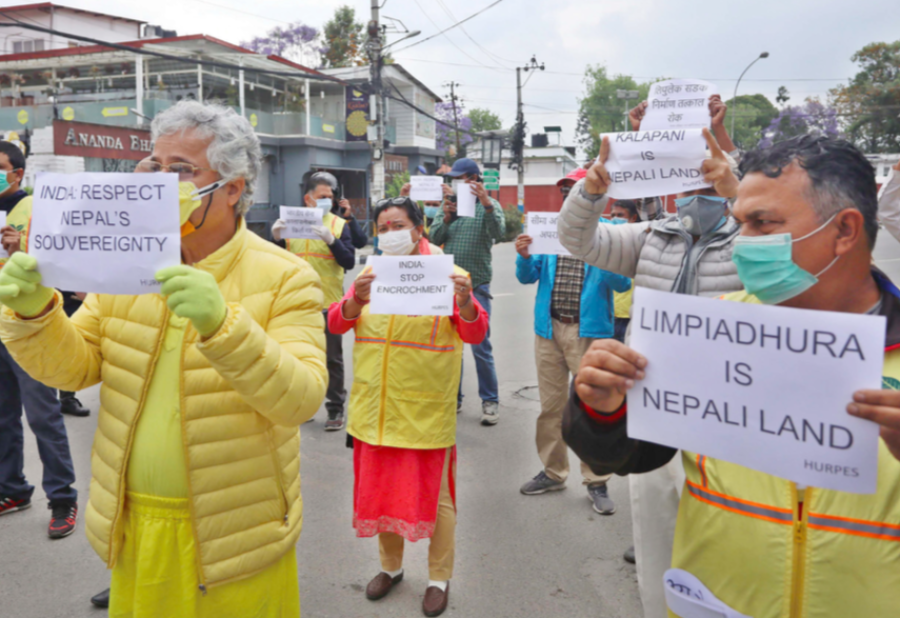National
Protests go on in the time of Covid-19
Experts are concerned that protesters have not been maintaining physical distance as it can worsen the situation.
Shuvam Dhungana
After Indian Minister for Defence Rajnath Singh announced the inauguration of a link road to Mansarovar that passes through Lipulekh in Nepal’s western frontier, hundreds of youths in different cities have been demonstrating against the encroachment despite lockdown restrictions.
According to the Metropolitan Police Office, Ranipokhari, over 200 protesters have been detained across the Valley in the past couple of days.
A total of 186 individuals, including 15 women, were arrested on Monday alone, said Senior Superintendent of Police Sushil Kumar Yadav, spokesperson for the Ranipokhari Police Office. “Even on Tuesday, 45 people have already been taken into custody.”
However, according to Yadav, no action was taken against them and they were released in the evening. “We detain them till the evening for not following the lockdown order,” said Yadav.
In the past few weeks, there have been several other demonstrations in the Valley. Last Friday, police arrested around 47 chinese nationals while they gathered for a sit-in outside Singha Durbar, demanding that they be allowed to leave for home.
The number of people taking to the streets has increased recently. On Saturday, nearly two dozen people including the family members and neighbours of Dibesh Pokharel gathered in Kalanki main road to show support and ask people to vote for Pokharel who recently made it among the top 7 finalists of American Idol. “The rally went for nearly half an hour before we ended it,” Dibesh's brother told the Post on the phone.
On April 24, Nepal Students’ Union, affiliated to the main opposition Nepali Congress, launched anti-government protests.
The demonstration was against the two controversial ordinances that the government had issued. Though the nationwide lockdown was enforced to control the spread of Covid-19, the union managed to stage the protests.
According to rights activist Charan Prasain, people gathering for protests in this situation is not right and risky. Instead of gathering, they can take up other forms such as submitting memoranda to the government or symbolic protests.
If people feel that they need to come out in the streets, then they should gather in small groups and maintain physical distance, said Prasain. “Even police, while detaining protesters, should be careful and use safety measures such as distancing in vans and also in custody.”
Nepal has been on a lockdown since March 24 to contain the spread of Covid-19; the latest extension until May 18 was the fourth. A total of 191 people have tested positive for the disease so far—57 reported on Tuesday alone. Thirty people have been discharged from hospital after recovering.
Even health experts have shown concerns over the protests as people were not following social distancing saying that it can worsen the situation.
“At a time when the cases of covid-19 are sharply increasing, gathering of people can be very dangerous,” said Dr Anup Bastola, spokesperson for the Sukraraj Tropical and Infectious Disease Hospital.
“Even if only one person happens to be infected among the protesters, the whole could get infected and later transfer [the virus] to others.”
“In this time, gathering simply means inviting covid-19 infection to yourself,” he warned. “Although governments have loosened the lockdown, people should be more aware and maintain social distancing more strictly as the number of infections are rising sharply.”
According to Senior Superintendent of Police Shyam Lal Gyawali, chief of the Metropolitan Police Range, Kathmandu, the protesters are arrested not because of their demonstration against the government, which is their right, but because they were not following the measures and not maintaining essential physical distance.
The ongoing protests have increased the risk of covid-19 infection not only in the public but also the personnel working in the field under high risk to ensure peace and public safety, Gyawali told the post.
“We are not stopping people from protesting; there are other ways of doing that. But demonstrating in the streets is inappropriate at this time,” he said.




 8.22°C Kathmandu
8.22°C Kathmandu














